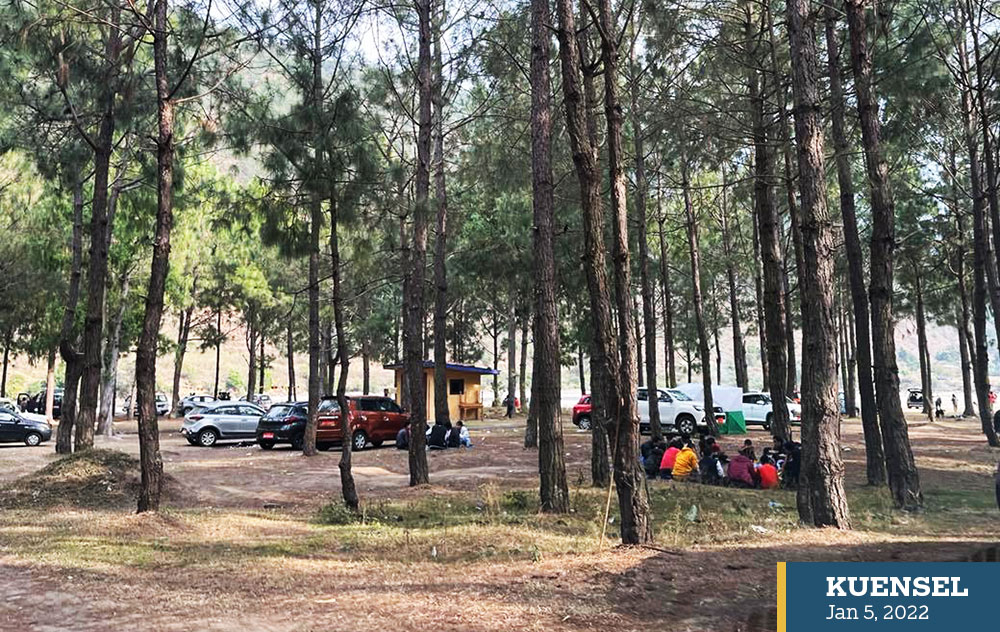… dzongkhag administration waiting for funds to develop the area
Chencho Dema | Punakha
Zomlingthang by the Mochhu in Punakha has become popular among picnickers and campers, especially after the pandemic. With the return of visitors, littering has become a problem.
From plastic bags, beer bottles and cans, to cigarette butts, the place is littered with all kinds of waste. At times, campers leave the bonfire still ablaze.
The Punakha dzongkhag administration has allowed people to gather for picnics after the pandemic restrictions eased. Those who wish to camp there at night have to seek permission from the dzongkhag.
A notice board at the site says though, “Night camping and organising entertainment programme is not allowed in this area.”
Access to the ground is free and many come for picnics, driving, or to enjoy games of khuru or archery during the day.
 The dzongkhag has been struggling with the garbage problem at Zomlingthang, especially on weekends and whenever there is an occasion to celebrate.
The dzongkhag has been struggling with the garbage problem at Zomlingthang, especially on weekends and whenever there is an occasion to celebrate.
On Nyilo or Winter Solstice, a popular holiday in western Bhutan, the large crowd had left waste strewn all over the area.
While the dzongkhag works to find a solution to the garbage issue, they are careful not to upset people by forbidding them from picnicking and congregating at Zomlingthang.
Punakha Dzongdag Thuji Tshering said that the dzongkhag intends to improve the Zomlingthang ground.
“We have drawn up a comprehensive development plan for Zomlingthang and will seek funds from relevant agencies including the Bhutan Trust Fund for Environmental Conservation. Once we receive funding, the ground will be developed, including fencing,” he said.
He said that the problem may not be resolved fully until then.
He also said that instead of concentrating on waste collection, they will instead monitor and impose fines. “I’m hoping that works, and I’ll also recommend patrolling,” he said.
Dzongdag Thuji Tshering said with the National Environment Commission’s (NEC) Zero Waste Mobile App, the problem might be lessened.
Residents of Retsa village, neighbouring Zomlingthang, and those residing across the road complain of loud noise from campers, particularly at night.
The situation then and now, according to Namgay Tshering, who has lived near the ground for the past forty years, is different.
“There was a time when we could sleep peacefully, but now, especially on the weekends, when there are celebrations, the loud music goes on until daybreak,” he said.
The residents nearby cleaned piles of trash the campers left behind, the 67-year-old said.
He said that occasionally, people, particularly young campers steal wood from their homes to light bonfires.
“We don’t mind visitors coming to enjoy their time at Zomlingthang as long as they respect our privacy and take back their waste,” he said.
Nima, another resident said that he occasionally finds people congregate, sing, and dance, then quarrel and cry.
“We are helpless and can’t do anything because if we speak up then they might come in a group and beat us,” he said. He said that an area once beautiful has turned into a dumping ground for waste.
The other residents also shared similar concerns.
Residents stated it would be helpful if authorities concerned could deploy a person to keep an eye on the waste and activity at Zomthingthang.
There are about nine households living across the Zomlingthang.


